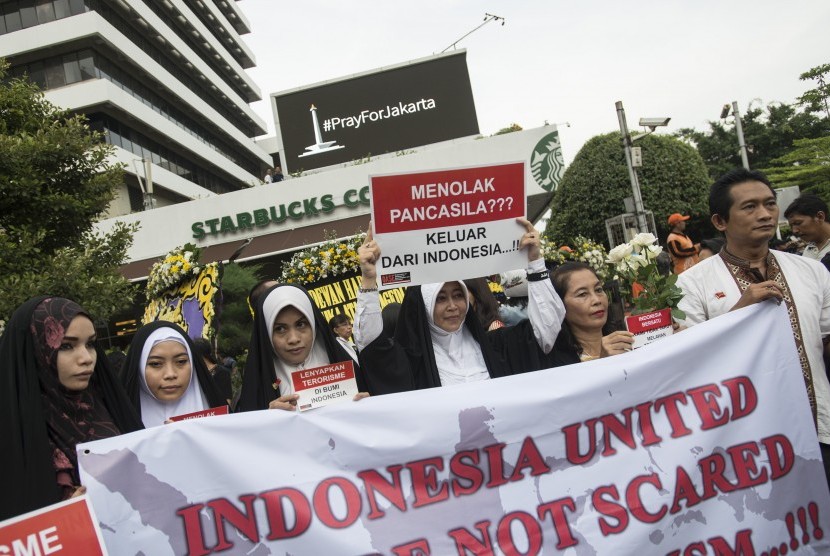REPUBLIKA.CO.ID, JAKARTA -- The National Police on Friday named Afif, also known as Sunakim, as being one of the attackers who committed carried out bomb attacks at MH.Thamrin Boulevard and Sarinah Department Store in Jakarta.
"Sunakim, also known as Afif, is the one who was in jeans, a black T-shirt and a hat," National Police Chief General Badrodin Haiti said here on Friday.
Afif was arrested in Aceh for his involvement in a training exercise to carry out terrorism related acts and was imprisoned for seven years.
However, the Disaster Victim Identification (DVI) Team of the national police is still carrying out the identification process to ascertain by collecting DNA samples from Afif's family members who live in Sumedang District, West Java Province.
On Thursday morning (Jan 14), six bombs exploded at MH.Thamrin boulevard in front of a Starbucks coffee shop and a police traffic booth.
As many as 24 people were injured and seven died in the attack.
Among the seven casualties, five were the attackers themselves while two were civilians.
Among the dead were two suicide bomb attackers while three other terrorists were killed in the shootout with police.
Of the two civilians who died, one was an Indonesian and the other a Canadian.
Jakarta Metropolitan Police Command Chief Inspector General Tito Karnavian has confirmed that the terrorists who orchestrated the attack in Jakarta on Thursday were linked to the ISIS terror group.
"Our team is now on the lookout for members of this terror network who are linked to the ISIS group in Raqqa," he stated during a press conference held at the presidential office following a meeting led by the president on the issue on Thursday evening.
He said the ISIS group had changed its strategy. They earlier operated only in Syria and Iraq, but after their leader, Abubakar Baghdadi, ordered them to spread their activities outside Iraq and Syria, they had begun setting up ISIS terror modules across the world, he explained.
"The terror cells can be found in France, Europe, North Africa, Turkey as well as Southeast Asia, including Indonesia, Malaysia, the Philippines, Thailand, and other countries," he pointed out.
In Southeast Asia, there is a figure keen to set up a "Khatibah Nusantara," and he wants to be the leader of the ISIS group in the region.
"Of late, a rivalry for leadership has developed. In the Philippines, they have set up a terror module in South Philippines, and now, multiple people are competing for leadership. In this connection, one of the ISIS figures launched these attacks. Meanwhile, we have identified the group, and we are still tracking them down," Tito affirmed.


